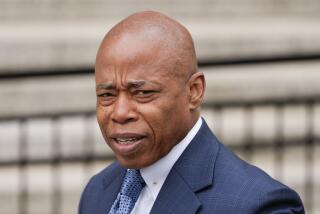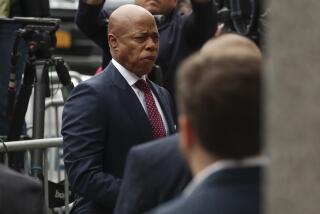Barry Convicted on 1 Count; Jury Deadlocks on 12 Others : Cocaine: Washington’s mayor is acquitted on another charge, and a mistrial is declared on the more serious counts. The two misdemeanor verdicts returned will stand.
WASHINGTON — Mayor Marion Barry was convicted Friday on one misdemeanor count of cocaine possession and acquitted of another by a federal court jury that declared itself hopelessly deadlocked on 12 other drug and perjury charges.
U.S. District Judge Thomas Penfield Jackson declared a mistrial on the deadlocked counts and set a Sept. 17 hearing to allow the prosecution to say if it wishes to retry Barry on those charges.
The verdicts returned by the jury on the two misdemeanor counts will stand.
Barry, a three-term mayor who had predicted that no jury in Washington would convict him, hugged his supporters and defense team in court and smiled at reporters when the mistrial was declared.
It was a stunning end to a six-week trial that featured an FBI videotape of the mayor smoking crack cocaine in a sting operation.
Barry had insisted all along that he had been singled out by vindictive federal prosecutors. He said the government spent millions trying to convict him, and the case created racial tension in the nation’s capital.
The jury found Barry guilty of charges that he possessed cocaine in November 1989 with longtime associate Doris Crenshaw. Crenshaw testified that she snorted cocaine with the mayor in her hotel room.
Barry was found innocent of charges that he possessed cocaine on Sept. 7, 1989.
The jury was hung on the three most serious counts, felony charges of lying to a federal grand jury about his dealings with Charles Lewis, a convicted cocaine dealer who was one of the government’s chief witnesses.
It also couldn’t agree on a verdict on the cocaine possession charge stemming from the FBI sting operation. In the FBI videotape, Barry was seen smoking crack cocaine with former girlfriend Rasheeda Moore at the Vista Hotel on Jan. 18.
All told, Barry had been charged with 10 counts of cocaine possession, three counts of perjury and one count of conspiracy to possess cocaine and conceal its use.
The mayor said repeatedly that he never used cocaine, and it wasn’t until closing arguments that Mundy acknowledged that Barry had used the drug. Even so, Mundy said the government had failed to produce the specifics of its case.
As he left the courthouse, Barry was mobbed by supporters urging him to seek reelection. Barry had said that he would not run for a fourth term, but there has been speculation in recent days that he would change his mind and run as an independent.
“He is relieved, obviously, and this is his 202nd day chemical free,” his press secretary Lurma Rackley said.
U.S. Atty. Jay Stephens was heckled as he defended the prosecution of the mayor.
He said that on the single conviction, the jury had held “Mr. Barry accountable for his criminal conduct and he must now accept responsibility for that conduct.”
He said he would review the case before deciding whether to seek a retrial. Jackson scheduled a hearing for Sept. 17.
The judge had asked the jury whether it wanted to resume deliberations on the remaining 12 counts. After conferring in the jury room, the panel said it was deadlocked.
“I am prepared to declare a mistrial on the remaining 12 charges,” Jackson said.
Mundy responded, “I move. . . .” and Jackson nodded in assent.
The cocaine possession charge is a misdemeanor and carries a maximum penalty of one year in jail and a $100,000 fine.
Barry was released on his own recognizance.
Thirteen witnesses testified during the trial that they had seen the mayor use drugs about 200 times. Mundy conceded that the mayor was an occasional cocaine user, but said the prosecution had relied on liars to make its case and had failed to prove the charges.
The mayor’s trial focused attention anew on race relations in the nation’s capital, a city whose population is 70% black.
Several black leaders suggested that Barry was prosecuted simply because he is a high-profile black politician. Among them was Nation of Islam Minister Louis Farrakhan, who was at first barred from attending the trial.
Two whites sat on the 12-member jury. The jury foreman was a white man.
Barry came to the city in 1965, a civil rights worker. Three years later, after the assassination of the Rev. Martin Luther King Jr., the city erupted in its worst racial violence. Barry was often credited with cooling tempers in the aftermath.
Barry had lost much of his support among white voters even before his arrest in January.
“The majority of whites are just plain annoyed and angry and just want this guy to go,” D.C. Councilman Jim Nathanson said before the trial began. Nathanson, who is white, represents a predominantly white district.
Many in the black community felt betrayed by the mayor, who had made appearance after appearance preaching the evils of drugs to the city’s youth.
After his arrest, Barry admitted to a problem with alcohol and prescription drugs, and he entered out-of-state treatment programs.
During six weeks of testimony, a parade of prosecution witnesses alleged that the mayor had snorted cocaine and smoked crack, opium and marijuana 200 times in a seven-year span.
Barry’s lawyers asserted that the prosecution witnesses--many of them admitted drug users--were lying in an attempt to ease their own legal problems.
The verdict is the culmination of a criminal investigation that began in December, 1988, after the mayor’s visits to Lewis’ hotel room in Washington, D.C.
Lewis testified that Barry used cocaine and crack repeatedly on two trips to the Virgin Islands. He said they also smoked crack in a Washington, D.C., hotel room, where he said Barry became so paranoid that he unscrewed bathroom light bulbs to get them checked for surveillance devices.
He testified that they conspired to cover up their drug use when police began investigating a complaint that Lewis had offered crack to a hotel maid.
Lewis began cooperating with the government a year ago, after he was convicted of drug charges in the Virgin Islands.
Barry’s lawyers depicted Lewis as a liar who fabricated allegations of drug use to shorten his time in prison.
Moore, the government’s star witness, testified that she and Barry used drugs together “at least 100 times” in hotels, boats and homes around the city from 1986 to 1989. They were lovers for two years, then simply partners in drug use, she said.
The defense attacked Moore’s credibility and motives.
She was nearly broke and in trouble with the police when the FBI asked her to cooperate in the sting operation, she admitted.
She almost never provided the court with any dates for her alleged drug use with Barry, saying she wasn’t good with numbers. The defense suggested she was making up the stories and didn’t want to give dates because they might conflict with Barry’s out-of-town trips.
More to Read
Sign up for Essential California
The most important California stories and recommendations in your inbox every morning.
You may occasionally receive promotional content from the Los Angeles Times.










